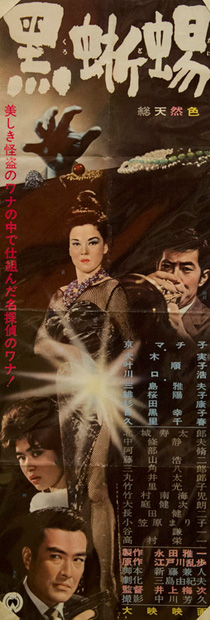Finally got to see the 1962 version of Kurotokage (which is Japanese for "black lizard"). It's an adaptation of the infamous 1934 detective novel by Edogawa Rampo more famously interpreted six years later by Kinji Fukasaku (featuring a drag queen in the lead role).
It is the story of a beautiful master criminal, the eponymous Black Lizard (she has this tattoo … ) and her arch rival, superdetective Akechi Kogoro. It is a masterpiece of ero guro nansensu (erotic grotesque nonsense), full of twists and turns, disguises, kidnapping, extortion, human dolls and human sofas (you'll see). Saw it on Turner Classic Movies of all places, so I should give them a shout out.
The film's director, Umetsugu Inoue, used to make a lot of musicals, and while the material here is far from such fanciful fare, song and dance are nevertheless inserted into the film (thankfully in dribs and drabs). The theme song features the word kurotokage sung to a quasi-James Bond melody. The Black Lizard herself, as well as her henchmen, have a worrying tendency to lapse into dance moves at odd intervals.
Yet somehow it works. It's just so over-the-top, the screen so saturated in color, the acting so hammy, the overall feeling so heightened that you can't help but get swept up in the nansensu. Now I understand what Fukasaku was trying to top with his version, why his film was so ridiculously campy and bizarre (and then there was that added LSD factor … ).
The cast is awesome. I was pleased to see several actors in this film who also appear in my favorite Yasuzo Masumura film, Giants and Toys, but whom I've seldom seen elsewhere. Chief among them is Hiroshi Kawaguchi who, if you've seen G&T, you'll remember as the young protagonist. OK, so he was in Masumura's first film, Kisses, and Kunio Watanabe's Chushingura and Ozu's 1959 remake of his own Floating Weeds, but I havent' seen those yet! I've got 'em, just haven't seen 'em (Japanese film is vast and deep). Perhaps I'll do a Hiroshi Kawaguchi retrospecive next …
Anyhow, Kawaguchi plays a supporting role as Black Lizard's chief operative (clearly no longer the leading man he was in the late 50s). Playing the Black Lizard herself is none other than Machiko Kyo, who everyone remembers as the noblewoman raped (?) in Rashomon. It's fun to see her here, in such a completely opposite genre, twelve years on and still stunning. Akechi Kogoro is portrayed by familiar face Minoru Oki (The Great Killing, Irezumi, Watari Ninja Boy, Yakuza Law: Lynching). And if you're particularly up on your Japanese character actors of the period, no mistaking Masao Mishima (Late Spring, Life of Oharu, Revenge, The Ceiling at Utsunomiya, Zatoichi's Pilgrimage, Harakiri, Illusion of Blood, Samurai Rebellion and on and on -- BTW, I've reviewed most of the films mentioned in this paragraph in my books).
If you're really into vintage Japanese cinema and you missed Kurotokage on TCM, I guess it's a little cruel to go on and on about it -- unless you're affiliated with one of those exclusive online film-sharing clubs, I can't imagine how you're going to see it. It's owned by Janus film (read Criterion), so perhaps they'll release it some day. Until then, we can only live in hope ...
The Beach Party Movies Part III
-
*The Horror of Party Beach (1964) – 5.0*
This is pretty great for a movie that many critics call the worst film of
all time. That is just stupid. Elit...
3 hours ago



4 comments:
Wow, vintage Nihon Noir, this is yet another one to see. VHS of it is available for sale, http://www.amazon.co.jp/%E9%BB%92%E8%9C%A5%E8%9C%B4-VHS-%E4%BA%AC%E3%83%9E%E3%83%81%E5%AD%90/dp/B00005GEAB/ref=sr_1_1?s=dvd&ie=UTF8&qid=1369453494&sr=1-1&keywords=%E9%BB%92%E3%81%A8%E3%81%8B%E3%81%92
I saw Inoue's version of Kurotokage on Hulu, which has a number of films Criterion has yet to issue on DVD. The film is closer in spirit to Edogawa Rampo's short novel, which is quite funny, especially if you're familiar with Rampo's other writings.
I've read my share of Edogawa Ranpo (pseudonymous play on the name 'Edgar Allan Poe') in the original language, I've been a fan since I was a child (it was retro for me even as a child to have a liking to his stuff), but E.R. never wrote anything that was "funny" per se, at least not intentionally. Perhaps the quirk-factor became funny eventually due to the passage of time, because his stuff got parodied enough, due to having had a strong impact on the Japanese collective conscious of his day.
BTW Peter thank you for sharing the info about Hulu, just found it (http://www.hulu.com/watch/370623) this is great!!
Post a Comment